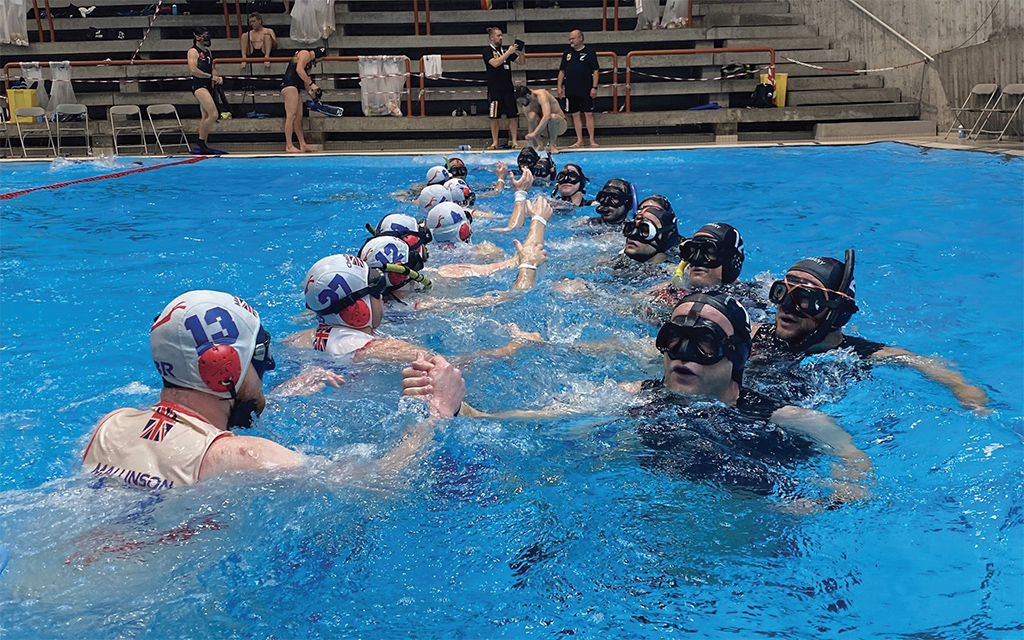
You’ve never heard of underwater rugby… where have you been? Kristina Pedder meets one of the few clubs in the UK dedicated to the sport.
What is underwater rugby?
Underwater rugby is a breath-hold sport in which two teams of six snorkellers attempt to place a weighted ball under the rim of the other team’s goal. Each team’s steel bin, shaped like a basketball hoop, stands on the bottom of the pool between three and a half to five metres deep.
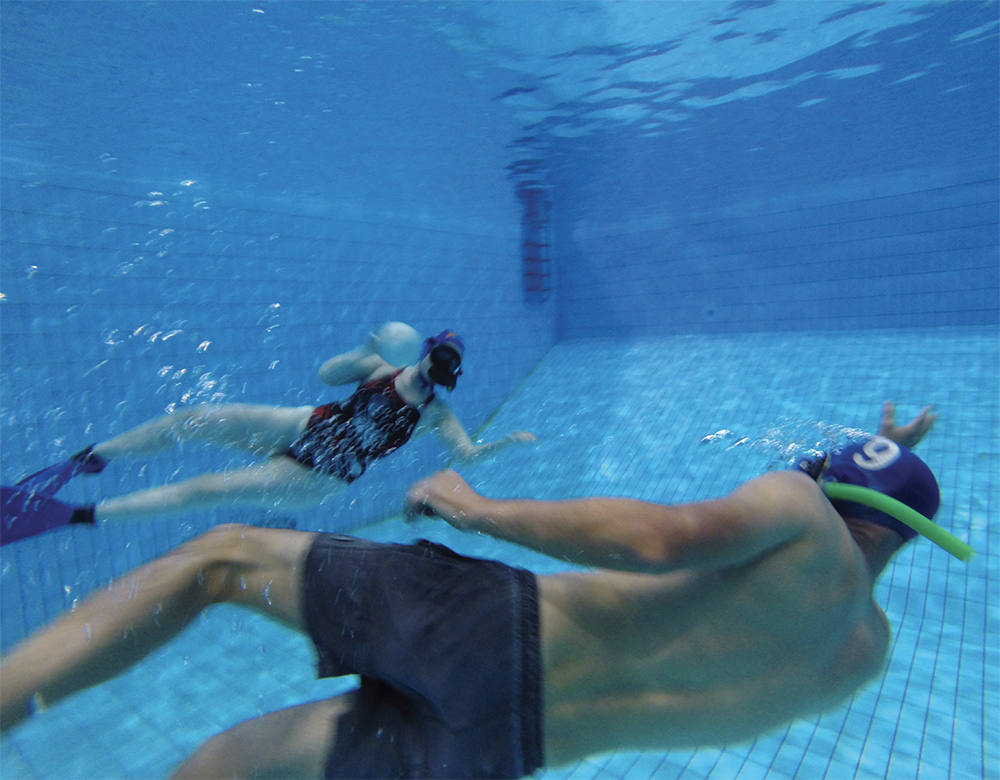
Did you invent the sport at the PURE club?
No. It developed out of the conditioning exercises of German divers in the 1960s, much as the more familiar underwater hockey (also known as octopush) was started by British divers. The sport is popular in other European countries, across Scandinavia, in parts of south and north America (notably Colombia), and in a few other places, including Singapore. The first international championship was held in 1980, after the sport was recognised by the Confédération Mondiale des Activités Subaquatiques (CMAS) in 1978.
When did the sport come to the UK?
Founder member and original treasurer Rob Bonnar recalls the club’s beginnings in 2013: “I was doing ballroom dancing lessons when I met a Slovakian guy called Oliver Kraus, and he asked me if I would like to set up an underwater rugby club with him.” Oli had fallen in love with the sport in his native Slovakia, and he became PURE’s founding Chair. This essentially introduced the sport to the UK. Putney Leisure Centre had a suitable pool but would not sanction the activity without appropriate insurance.
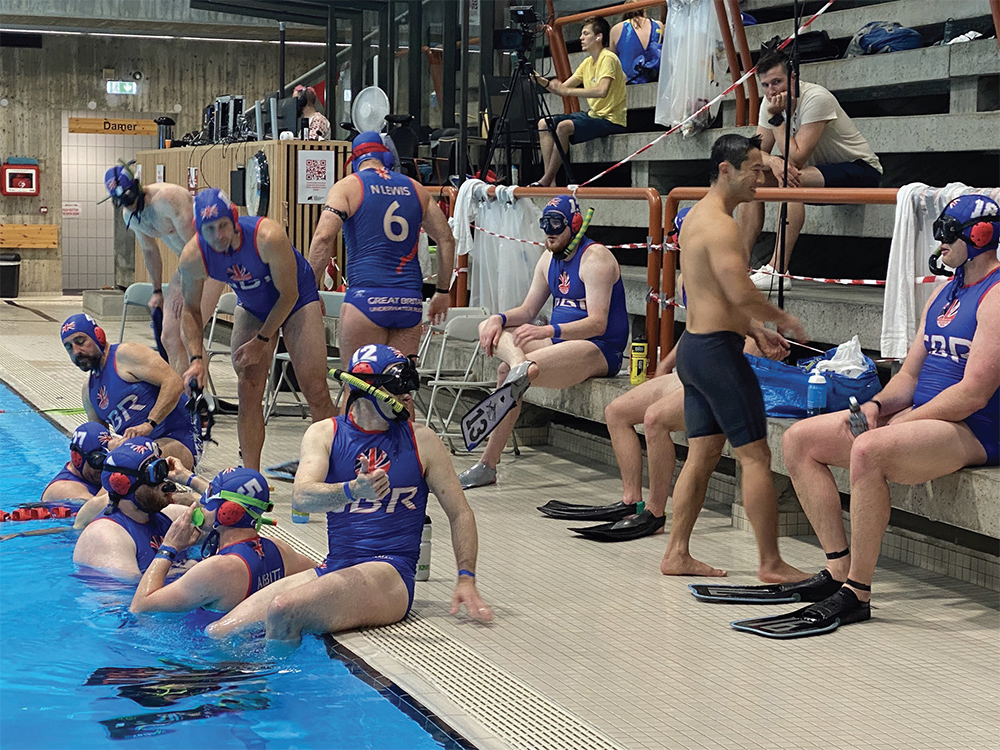
Oh dear, what happened next?
Early attempts to elicit advice from various underwater explorers were met with silence or polite bafflement, until we came to the attention of the late Roy Sherwin, a BSAC diver and former London Region Coach. Soon, thanks to Roy’s famous enthusiasm for underwater activities and to BSAC itself, we could play as snorkelling members of the newly minted BSAC club called PURE; branch number 2513.
PURE seems rather unusual among BSAC clubs – what is the club’s main aim?
Playing underwater rugby and getting others to play underwater rugby. And we will (respectfully) hijack anyone, anywhere to do it. The more players we have, the more useful our training sessions are. We would also like to see more UK clubs spring up. Due to the game’s intensity, each team fields 12 players to allow for frequent substitutions. It would be great to have at least this many people training every week. At present we have around 20 members. There is only one other BSAC club dedicated to underwater rugby, the Cheltenham Barracudas, so we can say we are almost unique.
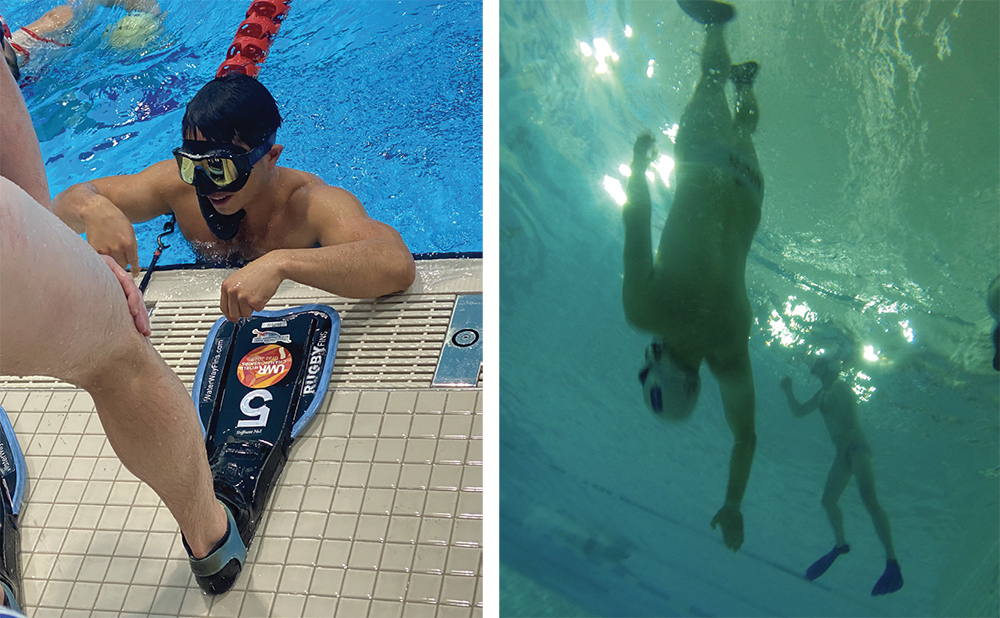
How do you play?
The teams start at opposite ends of the swimming pool, with one hand against the wall. When they get a signal, both teams then race to collect the ball, which is waiting in the centre of the pool. From that point, the game has begun, and the aim is to beat your opponents, using skill, strength and teamwork. The ball is negatively buoyant, so it sinks, and it is passed by ‘pushing’ the ball through the water to your teammates. The ball can be passed in any direction, including up and down, making underwater rugby the only (real) team sport played in three dimensions. There are notable comparisons to Quidditch, the airborne sport in the Harry Potter books.
Quidditch got quite physical sometimes…
So does underwater rugby. It is a contact sport: grappling is allowed between players if any of them is in contact with the ball. Goalkeepers generally protect the goal by lying across the top, and attackers must lever them off the goal to score. Players attacking the goal can also be pushed away by defenders, while opposing attackers swoop to win back the ball. Although the rules are simple, the game’s tactics are challenging.
What do you need to play?
Players wear mask, fins, snorkel, and a water-polo cap to protect their ears. If you can swim and hold your breath for 30 seconds, you should give it a go.
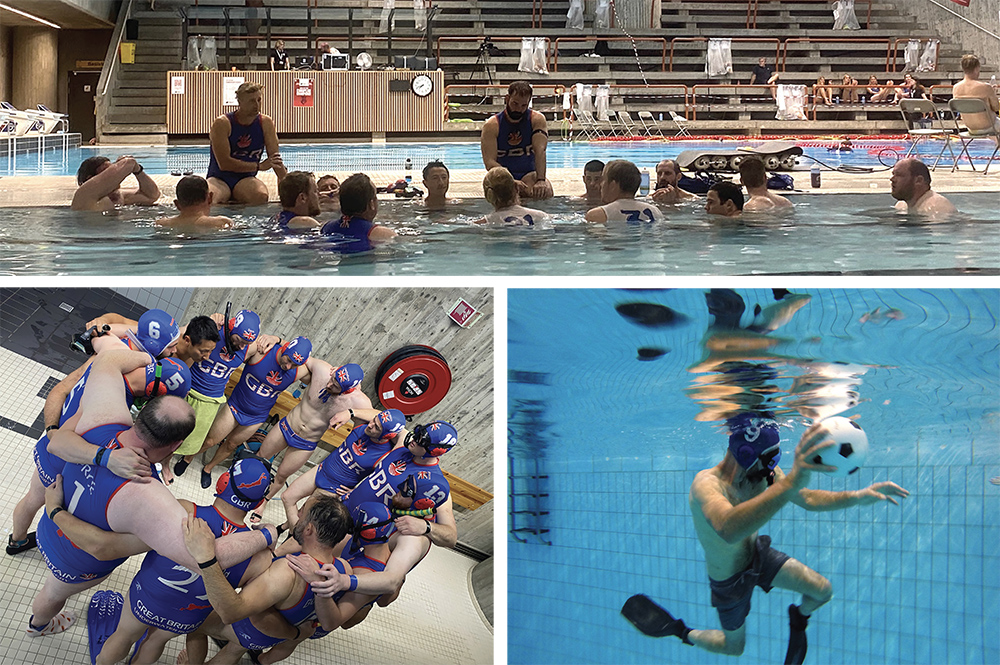
Do teams include both women and men?
Yes, our training and competition is mixed right up to international level. Cheltenham Barracudas recently hosted a women’s meet and tournament.
OK, how can people get involved?
We have spare equipment for newcomers and the first three sessions at PURE are free. At present our sessions are held at Putney Leisure Centre, from 8.30 to 10.30pm on Thursdays, and at Guildford Spectrum, from 9pm to 10pm on Mondays. In some other countries, players start training from a young age, but we have so far lacked the know-how to safely offer the sport to under-18s. That’s another area we’d like to work with BSAC on, in time specifically drawing on BSAC’s expertise in working with young people, to complement the promotion of snorkelling to this age group.
What do you do apart from training?
There is a running joke that every newcomer joins a fairly short queue for the GB international underwater rugby team. This is true, and there are GB team players in our club for newcomers to learn with. Despite there only being a few UK clubs, there are several domestic tournaments each year for all skill levels. We also travel to European events through the year, and plan to take some keen newbies to a mix and match in Luxembourg this autumn.
Why underwater rugby?
We asked PURE members what they liked about the sport.
James Massey, who joined us in Guildford recently having scuba dived and played underwater hockey for years, says: “Underwater rugby is great fun and any idiot can learn. I love it!”.
Jamie Ganley also joined shortly after we expanded to Guildford in 2023. He discovered that it was more fun than swimming: “I was a bit bored of doing lanes, and there was an underwater rugby session going on. I got invited along, was absolutely terrible, but I’m here six months later.” (Note from interviewee: he’s actually quite good.) For some, it extends the possibilities for underwater enjoyment.
Jason Musil has been scuba diving for 10 years but never seriously played a team sport: “I dived with Roy Sherwin at Teddington SAC, but only learned about the underwater rugby from some rather intense guys at his funeral. When I’m playing, it feels as though diving with seals became a competitive sport.”
Other players have come with breath-hold skills from spearfishing or free-diving, while former surface rugby players enjoy both the physical contact and a low-impact environment that is kind to old injuries. Although there is as yet no formal evidence that underwater rugby training improves fitness, strength, swimming ability, and awareness... all these traits that are so important to scuba divers and snorkellers get better the longer you play.
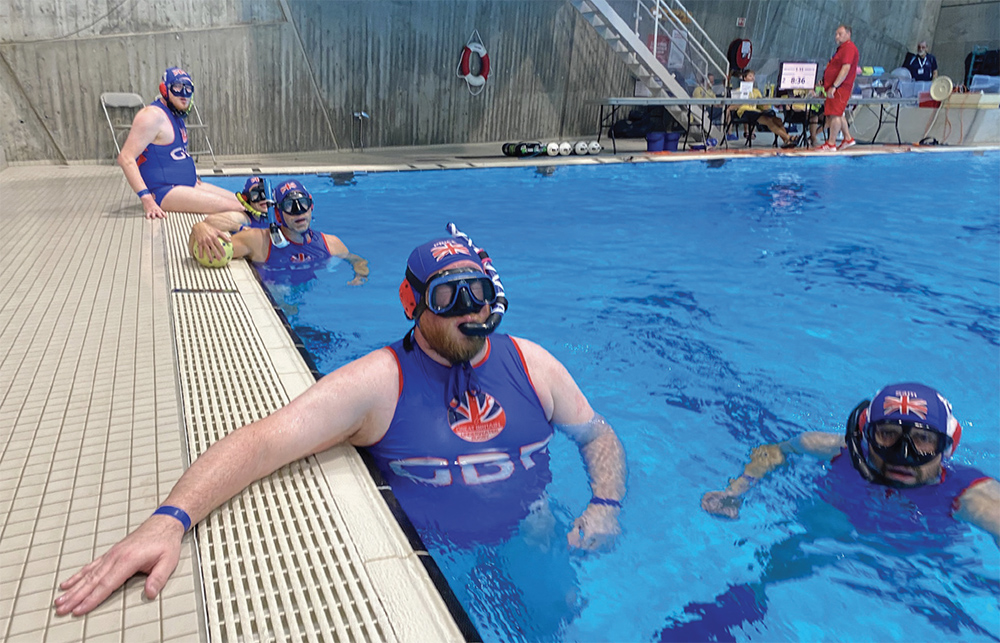
Is there a social side to the club?
Underwater rugby has an egalitarian and international social scene, with people passing through London frequently dropping in for a game. In the past few months, we have had visitors from Albania, Australia, Belgium, Colombia, France, Germany and Singapore. Unfortunately, our pool hours make it difficult to keep a regular pub schedule. But every new player will discover an international network of friends who love the sport and just want each other to do well.
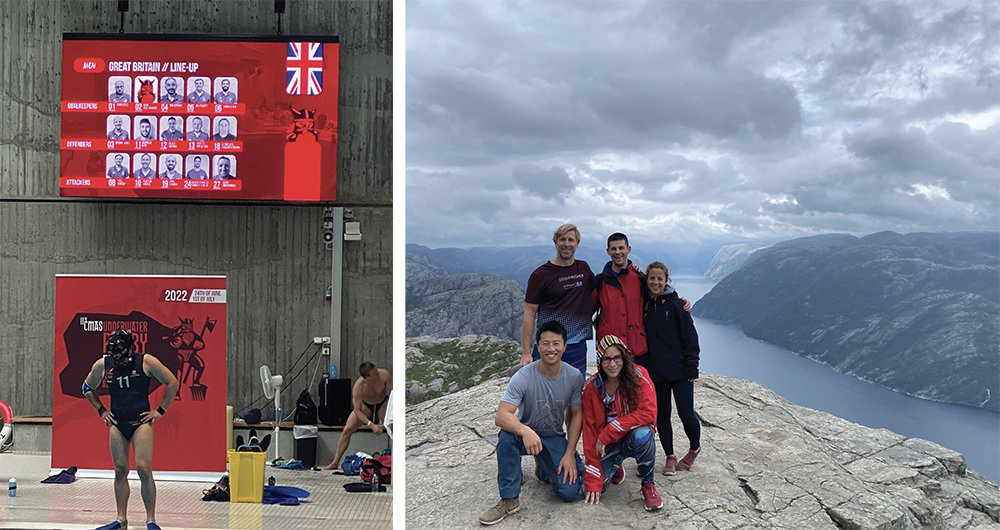
What next?
We hope to attract new players, people who love being underwater including current and potential divers and snorkellers. BSAC has been actively promoting snorkelling in recent years, and our accessible, addictively fun sport is a good fit with that. This article will help us, as just getting noticed is a big deal, but we are going to reach out to local BSAC branches to see what we can do for each other. We have already expanded from Putney to include a night in Guildford, which is taking on a life of its own. And as we bring more new players into the game, we are learning how to structure a beginners’ training programme, with scheduled newcomer sessions planned.
We would strongly encourage others to set up their own clubs, or to offer underwater rugby as a club activity. We can advise you on how to do it and we look forward to seeing some new friends in the pool.
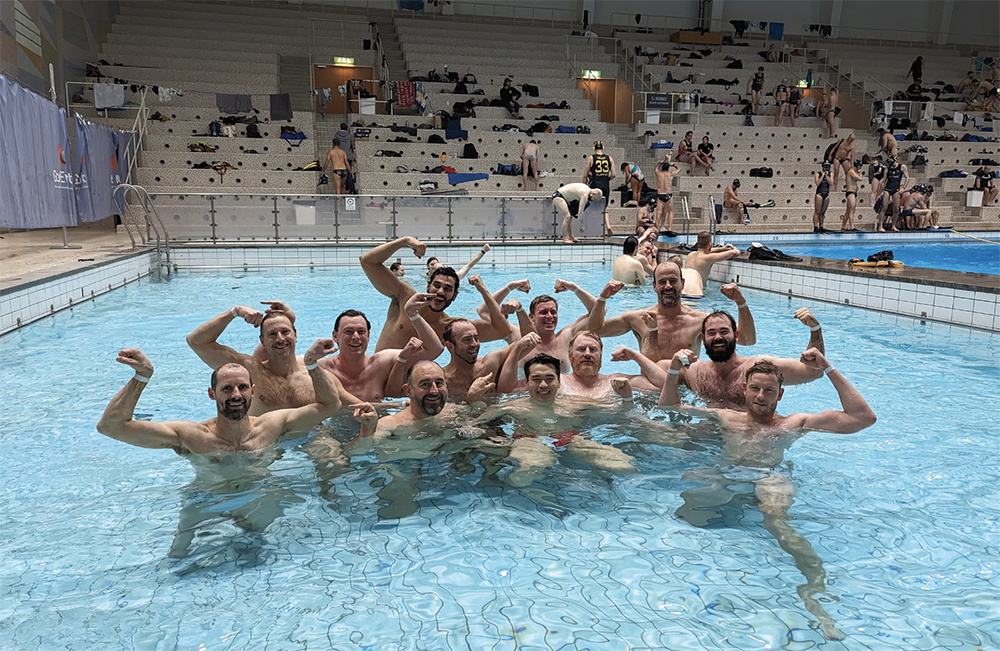
A warm welcome awaits
PURE members are always keen to tell newcomers about the club.
Founder member Rob Bonnar: “The club is very friendly, there’s no pressure, stress-free basically. There is very good craic, we have a great time. And because we’re based in London, lots of people come in and out.”
New recruit Jamie Ganley: “Everyone’s very friendly, it’s very easy to get involved. [...] Everyone’s been very helpful to guide me around, show me the rules, get me used to diving at depth. It’s a very welcoming club, really supportive, and I’m really, really enjoying it”.
Female player Elaine M, who started out with Cheltenham Barracudas: “I first got into underwater rugby four years ago and haven’t looked back since. This unique sport, which can be physically demanding, has a community of players that are supportive, friendly, and encouraging. I would greatly encourage anyone to come and give it a go.”
Harriet Glanville, club treasurer and long-time player: “I started playing underwater rugby while doing an internship in Cheltenham and immediately found an extremely welcoming community. The good vibes are mirrored at PURE in London for sure. As a woman it’s a great contact sport to play, as I’m very much able to compete with the guys, so I always feel strong and respected.”
Article ‘Club Focus – PURE Underwater Rugby’ by Kristina Pedder first published in SCUBA magazine, Issue 149 October 2024.
How do I find scuba diving near me?
Use the BSAC website to find a dive club near you. For more information on playing underwater rugby, visit the PURE Underwater Rugby club website or email underwater-rugby@hotmail.co.uk



